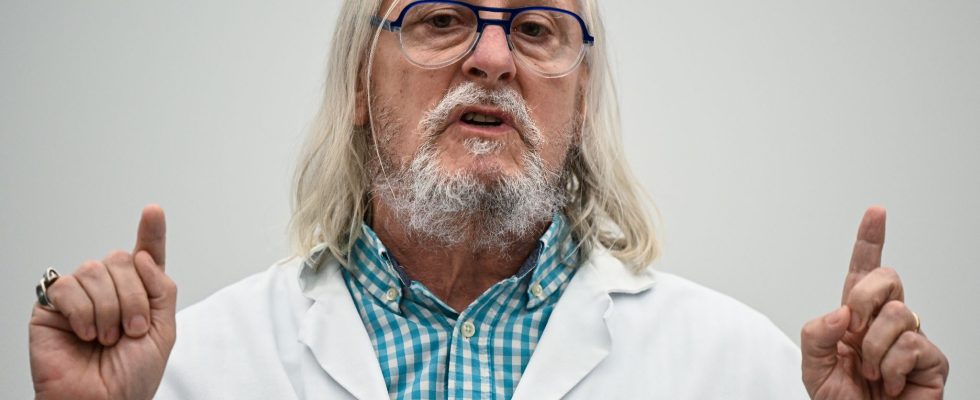“It’s a provocation, one more scandal,” denounces Professor Mathieu Molimard. The head of the medical pharmacology department at Bordeaux University Hospital, member of the French Society of Pharmacology and Therapeutics (SFPT) is not losing his temper. The IHU of Marseille (IHUm) has just published, in the journal New Microbes and New Infections, its controversial study relating to the systematic prescription, between 2020 and 2021, of hydroxychloroquine, but also of zinc, ivermectin and azitrhomycin to more than 30,000 patients with Covid-19, without pharmacological basis and in absence of any proof of effectiveness. Because despite hundreds of studies and clinical trials, hydroxychloroquine, whether or not associated with zinc, ivermectin or azitrhomycin, has never demonstrated its effectiveness in the treatment of Covid-19.
The Marseille institute had already published a preprint – a non-peer-reviewed version – of this work last March, on the MedRxiv platform. An extremely rare occurrence in the world of research, no less than 16 learned societies, including the SFPT, had decided to publish an article two months later in The world. The text qualified the IHUm study as “the largest wild clinical trial known to date” and assured that its authors, including Professor Didier Raoult, were guilty of having made prescriptions “outside of any marketing authorization, but also outside any ethical or legal framework.
A few days later, the National Medicines Safety Agency (ANSM), questioned by L’Express, agreed with the 16 learned societies and decided to take legal action. “This study can indeed be qualified as ‘research on the human person’ (RIPH) of category 1, it should therefore have benefited from a favorable opinion from a committee for the protection of people (CPP) and authorization from the “ANSM before being implemented”, which was not the case, indicated the agency.
Publication in a friendly journal
From, the preprint had been retracted from the MedRxiv platform, a rare occurrence, generally reserved for articles with serious design or ethical flaws. But the IHUm still decided to publish his study in the journal New Microbes and New Infections, nicknamed “IHU gazette” because historically close to the Marseille institute. For years, members of the IHU served on its editorial committee – a conflict of interest denounced by many researchers in ethics and scientific integrity, as L’Express already reported in 2020. This journal, founded in 2013 , published more than 700 studies in 2020, including… 234 co-signed by Professor Didier Raoult, the former director of the IHUm. “New Microbes and New Infections is linked to the IHU and still run by friends who accepted this publication with full knowledge of the underlying ethical problem: there is no chance of being able to withdraw this publication, except perhaps after a court decision “, deplores Mathieu Molimard.
Few changes should be noted between the preprint version and the final version of New Microbes and New Infections, except that the number of authors fell from fourteen to five. Didier Raoult is still present, and Peter McCullough, an extremely controversial anti-vaccine American doctor in the United States, in particular because he sells anti-Covid pills which have not demonstrated their effectiveness, appears.
The “dismaying” lack of reaction from the authorities
Another ethical concern concerns the way in which the IHUm validated the research internally. An IHUm document consulted by L’Express shows that the ethics committee of the Marseille institute – which cannot in any case replace a real committee for the protection of people – gave its agreement for this study in 12 hours, without review of the file, after a simple email from Pierre-Edouard Fournier, the new director of the Institute. “Mr. Fournier is, in a certain way, complicit, believes Mathieu Molimard. If we do not change the direction of the IHUm, nothing will change.”
The professor of pharmacology insists: “It is a scandal which continues and which benefits from the absence of firm reaction and sanctions from the authorities”. The specialist is all the more saddened by the situation as the ANSM has just lifted some of the sanctions that they had put in place against the IHUm after its investigation and those of the IGAS, which had resulted in vitriolic reports denouncing the many scientific, economic and human excesses of the most controversial institute in France. “On this aspect, the Marseille prosecutor’s office is still in the analysis phase”, indicated the Minister of Health François Braun last May, specifying that the investigation also concerns the new “wild” clinical trial.
Questioned by AFP on Monday November 6, the Ministries of Research and Health strongly condemned a “new violation of ethical rules”. This snub from Didier Raoult comes while the authorities are working on “creating a new relationship of trust between the State and the leaders of the IHUm”, add the two ministers. Also contacted by AFP, the Marseille hospitals (AP-HM), supervisory authority of the IHUm, also strongly condemned “the publication of this article relating to a study which, according to the ANSM, does not respect regulation and patient protection. The AP-HM recalls “having previously asked the authors to withdraw this preprint considering this study contrary to methodological and ethical rules”.
.
